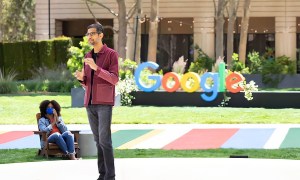

It was promised and Google I/O delivered, Android Studio is the company’s latest development environment for Android and it brings a lot of changes that should benefit both developers and users. Android Studio works like a WYSIWYG editor for application creation. You can make changes to things like layout and language, while seeing the real-time preview change as you tweak the settings. Google’s hoping this will help developers make better-looking apps with minimal effort.
One of the most exciting features shown was a simpler way for developers to scale applications for different screen sizes, which (if taken advantage of) could lead to many more tablet-optimized applications on Android. The lack of tablet apps is a sore spot for Android right now and often the most compelling reason to choose an iPad over any competing tablet.
There was also a new development console shown off, a way for developers to learn more about the performance of their applications on the Google Play Store. The console will suggest optimization techniques for developers to help reach a larger audience like translating the app into an additional language or designing it for use on tablets as well.
The benefit for developers here is obvious, but users will get some perks as well – mainly more well-designed Android apps that will work both on a smartphone and a tablet.


